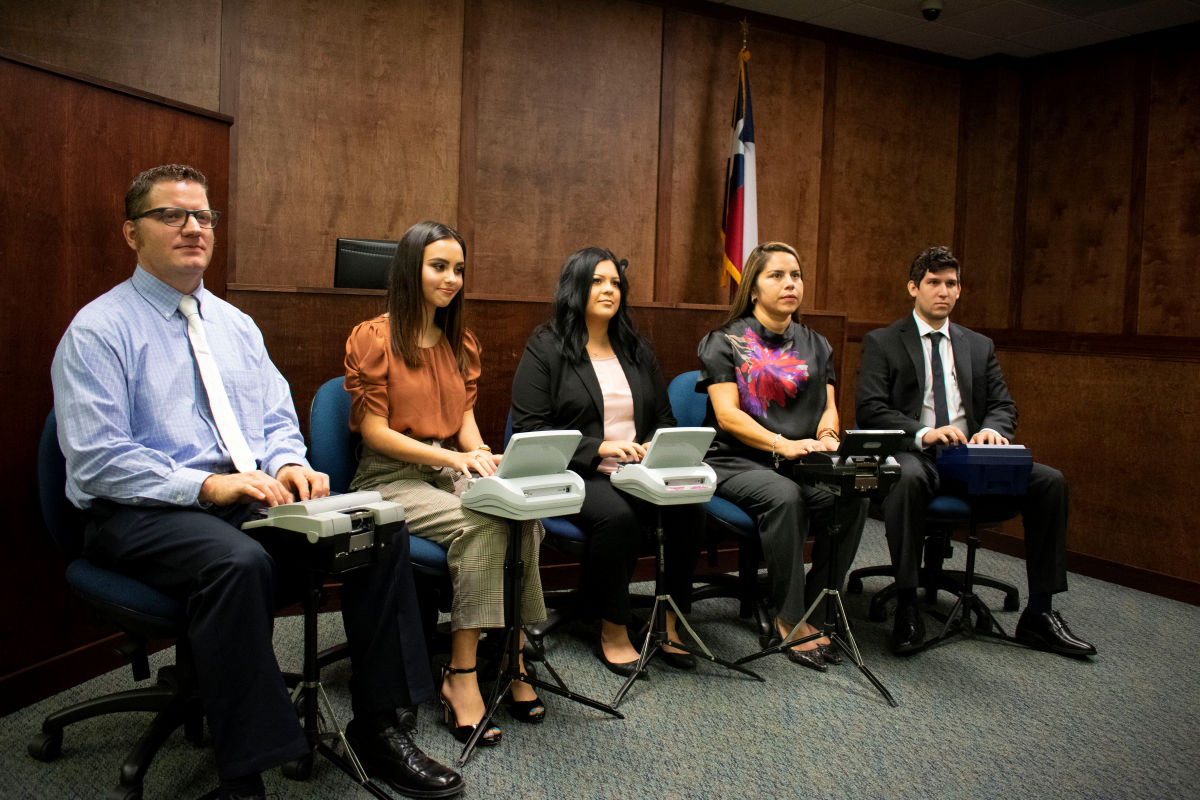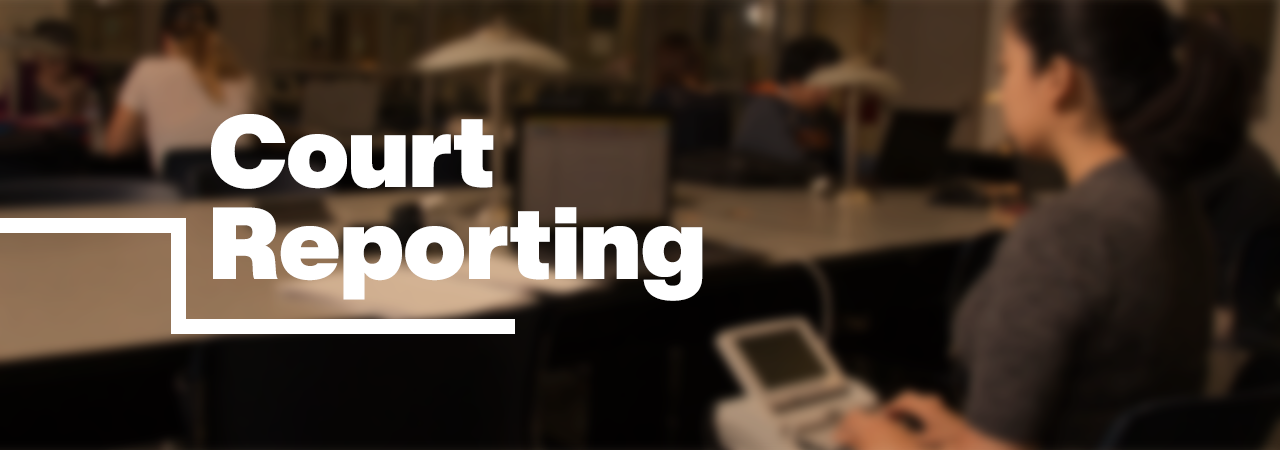Everything About Court Reporting: Vital Insights Into Its Significance in Regulation
Court reporting serves an essential feature within the legal structure, offering a accurate and reliable record of process. Through innovative strategies and devices, stenotype reporter record the nuances of statements and lawful dialogue. The relevance of their work prolongs beyond simple transcription. As the lawful landscape develops, so also does the role of modern technology in court reporting. Understanding these dynamics reveals much deeper implications for justice and transparency in the lawful system.
The Function of Court Reporters in the Legal System

Although typically forgotten, stenotype reporter play a vital duty in the legal system by making sure a exact and verbatim record of process. Their primary responsibility includes recording talked words throughout trials, depositions, and other legal events, which works as an official document for future referral. This documents is very important for appeals, as it provides the needed information for reviewing decisions made by courts and judges.
Court reporters should possess phenomenal listening skills and a deep understanding of legal terms to record the subtleties of testament and argumentation accurately. Their work adds to openness within the judicial procedure, enabling for accountability and justness. Additionally, they assist in accessibility to justice by making records available to involved events, guaranteeing that everyone has the possibility to review the process. This way, court reporters promote the integrity of the legal system, strengthening the significance of precise communication in issues of law.
Techniques and Devices Utilized in Court Reporting
In court reporting, different strategies and tools boost the accuracy and effectiveness of transcription. Stenography technology plays a significant function, enabling reporters to catch spoken words swiftly, while digital recording methods use alternate solutions for paperwork. Understanding these tools is essential for grasping just how court press reporters accomplish their vital function in the legal system.
Stenography Innovation Introduction
Stenography technology serves as the foundation of modern-day court reporting, allowing effective and exact transcription of talked discussion. Making use of specialized makers referred to as stenographs, stenotype reporter can capture speech at remarkable speeds, typically surpassing 200 words per minute. These makers employ an unique keyboard design that permits several tricks to be pushed all at once, developing phonetic representations of words - durham court reporting. This technique reduces the demand for substantial spelling and boosts transcription precision. Furthermore, clerks utilize different shorthand strategies and icons to more streamline the process, ensuring that no information is overlooked during proceedings. The assimilation of stenography technology not only cultivates reliable interaction in legal settings but likewise maintains the stability of the judicial procedure by giving accurate and trustworthy records of conversations
Digital Recording Methods
An increasing number of court reporting specialists are transforming to electronic recording techniques to enhance the accuracy and performance of their transcriptions. These methods utilize advanced audio and video modern technology to catch process in real-time. Digital recorders, usually combined with top quality microphones, ensure that every word spoken is preserved with quality. Furthermore, specialized software application can record audio files instantly, permitting quicker turnaround times. Some professionals incorporate twin recording systems for redundancy, guaranteeing no critical info is shed. In addition, digital recordings can be quickly indexed and browsed, promoting quick retrieval of certain segments. As legal environments evolve, accepting these digital devices not only improves the reporting procedure but also preserves the stability of the record.
The Importance of Precision in Transcription
Accuracy in transcription is essential in court reporting, as it guarantees that lawful documents show real material of process. This precision can greatly affect instance outcomes, influencing the decisions made by courts and judges. As a result, keeping high criteria of accuracy is extremely important in the lawful occupation.
Precision in Lawful Records
The legal system relies heavily on eloquent debates and influential unsupported claims, the true foundation of judicial process lies in the accuracy of lawful records. Exact transcription is essential, as it guarantees that every statement, question, and judgment is documented appropriately. Such precision serves numerous functions, consisting of offering a reputable reference for charm processes and maintaining the honesty of the judicial system. Errors in transcription can lead to misconceptions, false impressions, and possibly detrimental consequences for all events involved. Court press reporters have to possess remarkable skills and interest to detail, as their work directly affects the clearness of legal files. Inevitably, the precision of lawful records underpins the trust put in the judicial process, enhancing the value of careful transcription.

Effect On Situation Outcomes
When legal process unfold, the precision of transcription typically dictates the trajectory of a situation's end result. Accurate court reporting warranties that every word spoken is effectively recorded, allowing courts, attorneys, and judges to make informed decisions based on the record. Errors in transcription can cause misunderstandings, false impressions, and possibly unfair decisions. The honesty of lawful documents counts greatly on the accuracy of these documents, as they work as the foundation for allures and additional lawful activities. In high-stakes instances, where the ramifications are profound, the function of a stenotype reporter comes to be much more important. Preserving strenuous standards in transcription not just sustains the lawful procedure however also supports the principles of justice and fairness in the court room.
Court Reporting in Different Lawful Setups
Court reporting plays a vital duty throughout various lawful settings, ensuring that procedures are precisely recorded for future referral. In criminal court, court reporters transcribe statements, evidence, and judicial rulings, which are crucial for charms and situation evaluations. In civil litigation, precise records assist in the exploration process and give a dependable record for test process. Administrative hearings typically count on court press reporters to maintain an official document, making certain openness and accountability in governmental procedures. Family courts also take advantage of court reporting, as accurate paperwork of procedures can affect protection choices and negotiations. In addition, depositions in pre-trial phases call for specific recordings to catch the subtleties of witness statements, which might be substantial in shaping instance techniques. On the whole, court reporting works as a cornerstone in the legal system, promoting fairness and clarity throughout varied judicial environments.
The Impact of Modern Technology on Court Reporting
As technology remains to progress, its impact on court reporting has actually come to be significantly significant. Advancements such as electronic recording, real-time transcription discover here software application, and artificial intelligence have actually transformed typical methods. Digital audio recorders now capture court room proceedings with impressive quality, allowing court reporters to concentrate on subtleties and context instead of entirely on typing. Real-time transcription modern technologies allow instant accessibility to records, promoting efficiency and enhancing cooperation among lawyers. Furthermore, expert system devices are being incorporated to help in the transcription procedure, decreasing human error and expediting file generation. Despite these improvements, the important abilities of court reporters remain vital, as they supply a nuanced understanding of legal language and court room dynamics. Inevitably, innovation enhances instead of replaces the proficiency of court press reporters, making certain that the stability and precision of lawful paperwork are promoted in a significantly electronic landscape.
Job Opportunities and Pathways in Court Reporting
The advancement of modern technology in court reporting has actually opened a range of job opportunities for aspiring experts in the area. Generally, court press reporters were mostly in charge of transcribing legal proceedings. However, innovations such as digital recording and real-time reporting have actually broadened their functions.
Today, court reporters can concentrate on areas such as captioning for tv broadcasts, offering transcription solutions for lawful firms, and operating in the business sector for depositions or meetings - durham court reporting. In addition, opportunities in remote reporting, especially because of the rise of digital courts, have actually become significantly prevalent
Educational pathways include formal training programs, certification training courses, and proceeding education and learning to stay updated with technical adjustments. Networking within professional and legal organizations likewise plays a substantial role in job development. In general, the diverse possibilities in court reporting show the vibrant nature of the legal career and the increasing demand for competent professionals.
The Future of Court Reporting in an Evolving Legal Landscape
Just how will the function of court reporting adjust as the legal landscape proceeds to advance? As innovation advances, court reporting is likely to embrace innovative tools such as expert system and real-time transcription software application. These advancements might boost accuracy and performance in capturing legal process. Moreover, the enhancing frequency of remote hearings necessitates that stenotype reporter come to be adept in digital systems, ensuring smooth documents no matter place.
At the same time, stenotype reporter will certainly need to adapt their abilities to manage new kinds of cases, such as those involving cyber legislation and intellectual home disagreements, which require specialized knowledge. Furthermore, the need for instantaneous access to transcripts will push specialists to supply quicker turn-around times without compromising quality. Eventually, the future of court reporting will certainly rest on an equilibrium in between conventional skills and technical assimilation, making certain that the honesty of the lawful procedure remains intact in an increasingly digital world.
Frequently Asked Questions
Exactly How Do Stenotype Reporter Manage Delicate Info During Proceedings?

What Qualifications Are Required to Come To Be a Stenotype Reporter?
To end up being a court reporter, individuals generally need a secondary school diploma, specialized training from an approved program, effectiveness in shorthand or voice writing, and qualification or licensure, depending upon state requirements and regulations.
Are Court Reporters Required to Have a Certificate?
Court reporters are often called for to acquire a license, relying on the jurisdiction. Licensing warranties i was reading this that they satisfy specific requirements of proficiency and expertise, which is necessary for maintaining the honesty of legal process.
How Do Stenotype Reporter Manage Various Accents and Dialects?
Stenotype reporter manage various accents and languages with extensive training, method, and familiarity with different speech patterns. They often utilize specialized software program and methods to properly capture spoken words, making certain clearness and accuracy in their transcripts.
What Is the Typical Wage for a Court Press reporter?
The ordinary salary for a stenotype reporter differs by location and experience, usually varying from $50,000 to $80,000 annually. In high-demand areas, incomes can go beyond $100,000, reflecting the occupation's Continued relevance and specialized skills.
Typically forgotten, court reporters play a vital duty in the legal system by making sure a verbatim and accurate record of process. In criminal court, court press reporters record testimonies, evidence, and judicial judgments, which are essential for charms and instance testimonials. Family courts additionally benefit from court reporting, as accurate documentation of procedures can affect guardianship decisions and negotiations. Generally, court press reporters were mainly accountable for recording lawful process. Today, court press reporters can specialize in locations such as captioning for television broadcasts, supplying transcription solutions for lawful companies, and functioning in the company field for depositions or meetings.